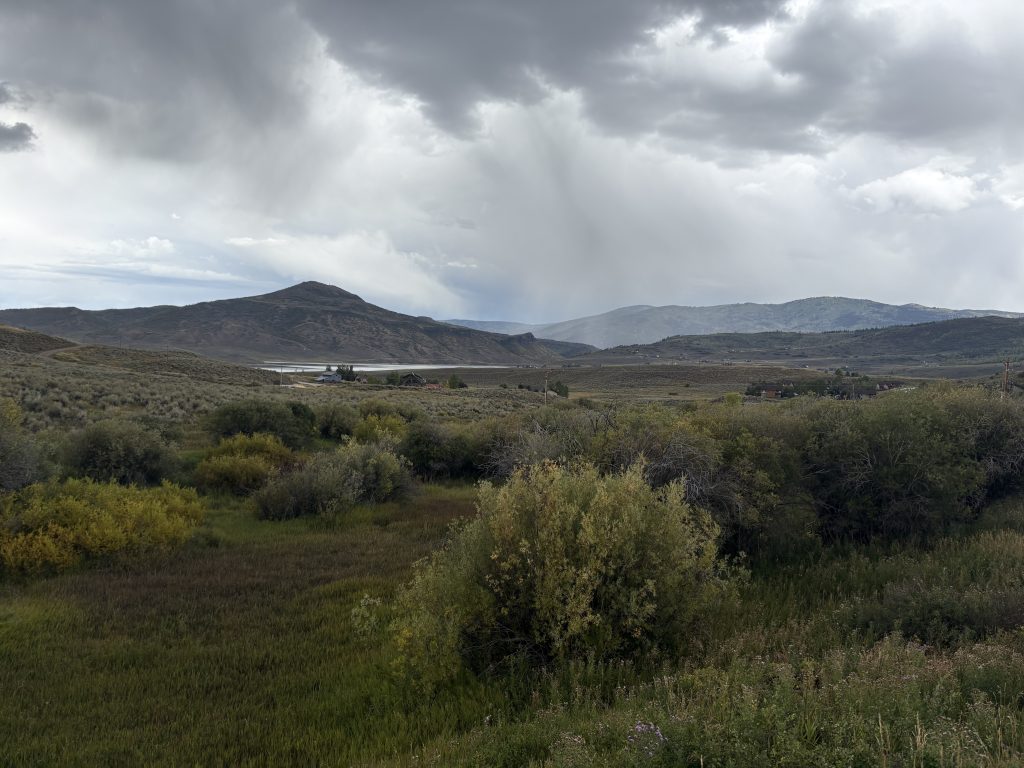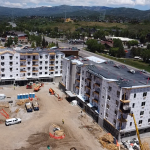Steamboat Springs City Council weighs in on Stagecoach Mountain Ranch development
Workforce housing, traffic impacts among concerns

Trevor Ballantyne/Steamboat Pilot & Today
Despite a lack of formal authority to push back against the Stagecoach Mountain Ranch development, the Steamboat Springs City Council is weighing in on the project in advance of Routt County’s Oct. 22 deadline for the city’s comments.
While the sprawling 6,100-acre development lies outside the city’s land-use jurisdiction — limiting City Council’s role to questions and comments — councilors agreed at their regular meeting on Tuesday that Steamboat Springs cannot afford to overlook the indirect and cumulative effects the project may have on the community.
“Our authority is very limited other than just providing comments as to what we feel the impacts are and what you would like the county to consider when they’re reviewing that application,” said City Manager Tom Leeson, who added that staff intends to draft a letter reflecting council’s input and present it for review at the Oct. 21 council meeting to meet the county’s deadline.
Councilor Amy Dickson was perhaps the most vocal councilor in emphasizing the city’s need to submit comments on the project, noting that Discovery Land Company — the Montana-based developer behind the Yellowstone Club — is spearheading the development.
“To think this won’t impact Steamboat is very shortsighted,” said Dickson, who outlined several critical concerns, starting with traffic impacts on Colorado Highway 131.
“Many people already drive on this daily to commute to Steamboat. Hundreds of employees and residents and guests from that development will create significant traffic pressure on a road designed not for this volume,” she said.
Dickson also raised worries about workforce housing. While the developer plans for 481 full-time equivalent employees, only 95 workforce housing units are included in the plan.
“That leaves almost 400 employees and their families to find housing elsewhere. Where will they live?” she said. “That’s going to put pressure on the city of Steamboat Springs and our housing. It’s also going to put pressure on the local businesses to find other employees.”
She pointed to Big Sky, Montana as an example where the Yellowstone Club contributed to skyrocketing housing costs pushing workers farther from jobs.
Water quality was another key concern for Dickson, who highlighted potential risks to Stagecoach Reservoir and downstream impacts on the Yampa River. She referenced lawsuits and complaints related to water quality impacts at the Yellowstone Club as a cautionary tale.
“The Bob Adams Airport … is a city-owned property,” said Dickson. “For people to say, ‘We won’t see private jets flying into Bob Adams,’ they’re wrong. We will. We already do. So what is that impact to our city, having more aircraft flying over Steamboat?”
Lastly, Dickson underscored the strain an increased population would place on local fire response and police services, noting they “will not turn a blind eye if there’s an emergency out there.”
Councilor Dakotah McGinlay echoed Dickson’s concerns and relayed sentiments from community members.
“I’ve heard from a lot of people … that are really concerned about this and just feel like we’re being bulldozed a little bit,” she said. “A big development can do whatever it wants, the county has its hands tied, they’re doing what they can, but this feels exactly like what Amy (Dickson) said — the Yellowstone Club coming in, using our local resources but making their own kind of bubble.”
McGinlay requested exploring whether the county could increase workforce housing requirements or implement restrictions, such as limiting lot sizes, to reduce the development’s impacts.
Councilor Joella West reinforced the traffic concerns, noting that many students from Oak Creek and Stagecoach rely on safe commutes into Steamboat schools. She also noted that mutual aid agreements mean that Steamboat’s fire department will likely be called for emergencies in the development area, further stressing resources.
Councilor Michael Buccino acknowledged the iterated concerns as valid and encouraged councilors to thoroughly review the submitted materials. He added that he has had no recent contact with the development team since leaving his role with Discovery Land Company over a year ago after concerns were raised regarding a conflict of interest.
“At this point I’m just cautiously moving forward with it, reading (the materials), and just kind of being a sideline partner in that,” said Buccino.
Councilor Steve Muntean expressed interest in understanding the actual impacts experienced by communities near other Discovery Land Company projects, such as the Yellowstone Club, and asked what mitigation efforts had been implemented in those areas.
“I’m really concerned about the wage side of things, because if you add 400 employees, what’s going to convince those employees to go down there?” said Muntean. “Well, if you have 95 units to live in, that’s going to convince 95 people, but the other 300 or so are going to go down there for more money and better benefits, and how is this community going to be able to match those?”
Council President Gail Garey reminded colleagues the development’s access routes to the airport and Stagecoach would heavily impact traffic through Steamboat.
She referenced the book “Billionaire Wilderness” by Yale University professor Justin Farrell, who spoke at the Routt County Economic Summit in May. The book explores such developments’ socioeconomic impacts, highlighting income inequality and the mixed results of charitable giving by these communities.
McGinlay asked whether the city could impose impact fees for developments outside its limits given the significant effects, to which City Attorney Dan Foote replied that the city lacks direct regulatory authority or coercive power to mandate fees on projects outside its jurisdiction.
The possibility of Discovery Land Company providing voluntary impact fees exists if they are “agreeable,” added Foote, but the city has no power to require them.
Council agreed to direct city staff to draft the letter based on council comments for review during council’s Oct. 21 meeting to meet the county’s Oct. 22 deadline.
Updates on the Stagecoach Mountain Ranch development application process can be viewed at co.routt.co.us/1023/Stagecoach-Mountain-Ranch.
Public hearings on the development are expected to begin early next year. To submit public comment ahead of the hearings, visit tinyurl.com/4w89vm42 or email PlanningDept@co.routt.co.us.

Support Local Journalism

Support Local Journalism
Readers around Steamboat and Routt County make the Steamboat Pilot & Today’s work possible. Your financial contribution supports our efforts to deliver quality, locally relevant journalism.
Now more than ever, your support is critical to help us keep our community informed about the evolving coronavirus pandemic and the impact it is having locally. Every contribution, however large or small, will make a difference.
Each donation will be used exclusively for the development and creation of increased news coverage.










